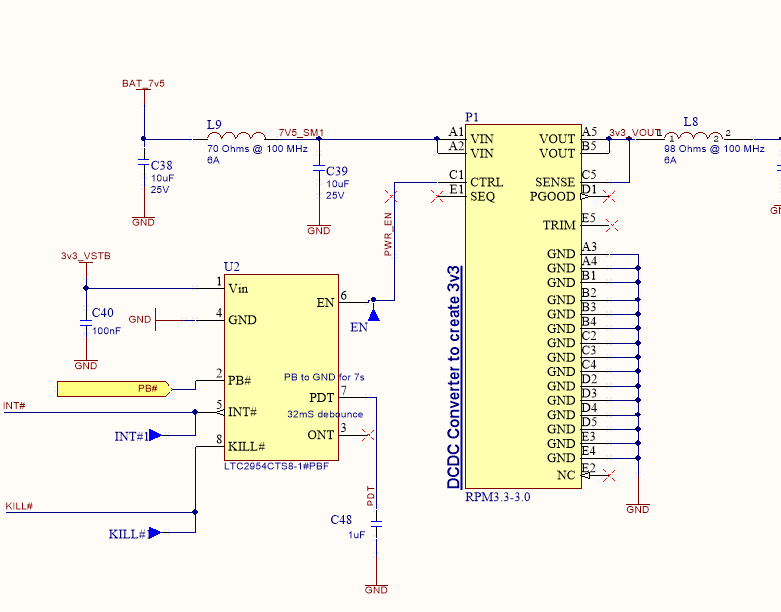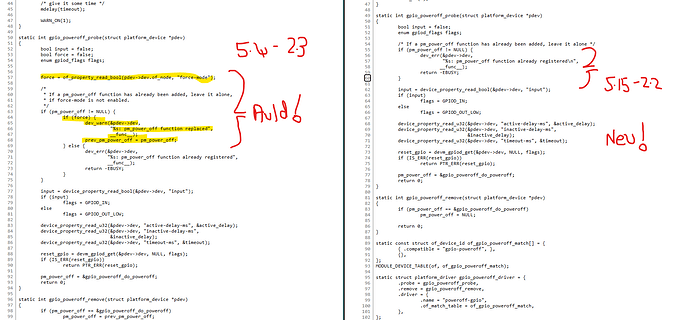Hi Jeremias,
Thanks for getting back so quickly.
Just to get this working quickly, so it can be checked out I am modifying the design tree directly.
So for the moment, I am using the evaluation board, so I am editing “imx8x-colibri-eval-v3.dtsi”
step 1. check out the tree
source tcb-env-setup.sh
torizoncore-builder dt checkout
step 2. edit my imx8x-colibri.dtsi
So I am going to nominate SODIMM105 or GPIO3 line 19 as the ACTIVE LOW output, so I find and edit it
pinctrl_hog1: hog1grp {
fsl,pins = <
IMX8QXP_CSI_D07_CI_PI_D09 0x61 /* SODIMM 65 */
IMX8QXP_QSPI0A_DATA2_LSIO_GPIO3_IO11 0x20 /* SODIMM 69 */
IMX8QXP_SAI0_TXC_LSIO_GPIO0_IO26 0x20 /* SODIMM 79 */
IMX8QXP_CSI_D02_CI_PI_D04 0x61 /* SODIMM 79 */
IMX8QXP_ENET0_RGMII_RXC_LSIO_GPIO5_IO03 0x06000020 /* SODIMM 85 */
IMX8QXP_CSI_D06_CI_PI_D08 0x61 /* SODIMM 85 */
IMX8QXP_SAI0_RXD_LSIO_GPIO0_IO27 0x20 /* SODIMM 97 */
IMX8QXP_CSI_D03_CI_PI_D05 0x61 /* SODIMM 97 */
IMX8QXP_SAI0_TXFS_LSIO_GPIO0_IO28 0x20 /* SODIMM 101 */
IMX8QXP_CSI_D00_CI_PI_D02 0x61 /* SODIMM 101 */
IMX8QXP_SAI0_TXD_LSIO_GPIO0_IO25 0x20 /* SODIMM 103 */
IMX8QXP_CSI_D01_CI_PI_D03 0x61 /* SODIMM 103 */
**IMX8QXP_QSPI0B_DATA1_LSIO_GPIO3_IO19 0x21 /* SODIMM 105 */**
IMX8QXP_USB_SS3_TC2_LSIO_GPIO4_IO05 0x20 /* SODIMM 127 */
IMX8QXP_USB_SS3_TC3_LSIO_GPIO4_IO06 0x20 /* SODIMM 131 */
IMX8QXP_USB_SS3_TC1_LSIO_GPIO4_IO04 0x20 /* SODIMM 133 */
IMX8QXP_CSI_PCLK_LSIO_GPIO3_IO00 0x20 /* SODIMM 96 */
step 3. do a test apply to see if this throws an error
torizoncore-builder dt apply device-trees/dts-arm64/imx8qxp-colibri-eval-v3.dts
Result: No error
step 4. edit the imx8x-colibri-eval-v3.dtsi file , and add in the gpio-poweroff driver.
/* Colibri UART_A */
&lpuart3 {
status= “okay”;
};
/ load poweroff driver /
gpio-poweroff {
compatible = “gpio-poweroff”;
gpios = <&gpio3 19 GPIO_ACTIVE_LOW>;
};
&lsio_gpio3 {
/*
* Add GPIO3_10 as a wakeup source:
* Pin: 157 SC_P_QSPI0A_DATA1 (SODIMM_45)
* Type: 6 SC_PAD_WAKEUP_RISE_EDGE
* Line: 10 GPIO3_IO10
*/
pad-wakeup = <IMX8QXP_QSPI0A_DATA1 6 10>;
pad-wakeup-num = <1>;
};
step 5. do another test apply to see if this throws an error
torizoncore-builder dt apply device-trees/dts-arm64/imx8qxp-colibri-eval-v3.dts
this time…
Error: device-trees/dts-arm64/imx8x-colibri-eval-v3.dtsi:126.1-14 syntax error
FATAL ERROR: Unable to parse input tree
error: cannot apply device-trees/dts-arm64/imx8qxp-colibri-eval-v3.dts.
By commenting out the line gpios = <&gpio3 19 GPIO_ACTIVE_LOW>; the problem seems to be with
compatible = “gpio-poweroff”;
I had assumed with the kernel modifications, this would be accessible without doing much more.
Cannot find much more information than GPIO (Linux) (toradex.com)
Any ideas are gratefully received.
Fatlinux

